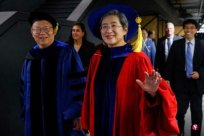After 10 years of ownership lawsuits, 51 boxes of documents such as Chiang Kai -shek and Chiang Kai -shek and Chiang Kai -shek's Diary (two Chiang Diary), which are currently in the Institute of Hoover, Institute of Stanford University, will return to Taiwan National History Museum.
Comprehensive Taiwan CCTV and the San Francisco Standard reported that the San Jose Federal Regional Court in California in the United States ruled on July 11 that 51 boxes of documents including the two Chiang Diary belonged toThe National History Museum of Taiwan means that the dispute between the ownership of the two Jiangsian diary and other cultural relics has finally settled after 10 years of lawsuits.
Chen Yishen, the director of the National History Museum, said that the National History Museum had sent people to the United States to count the number of cultural relics two months ago. It is estimated that the amount of commissioning to be commissioned is expected to be completed in the second half of the year.The most watched part of the Jiang Diary, Chiang Kai -shek served as the diary of the first president from 1948 to 1954, and will be published at the end of October this year.
Jiang Jingguo's daughter -in -law Jiang Fangzhi Yi lent 51 boxes of documents such as the two Jiang Diary to the American Hoover Institute in 2005, and authorized the Institute to provide a copy of the document to interested researchers.She and six other members of the Jiang family later signed an agreement to move the ownership of these documents to the History Museum of the State.
But Jiang Youmei, the granddaughter of Jiang Jingguo, believes that the ownership of the diary should be shared by Jiang Jingguo's heirs and stored in the family instead of handing over the National History Museum, which makes the document ownership attributable to controversy.The Hoover Institute was worried that the diary ownership would be sued by the relevant person, and in September 2013, all the people who might claim the ownership of the diary ownership sued all the prosecution.
The National History Museum of Taiwan also filed a confirmation of the ownership lawsuit in November 2015. The Taipei District Court's decision in 2020.Managed by the State History Museum; the part of the non -President's relics is shared by the Jiang family's heirs.The second trial of the case was maintained in 2022, and the US court also recognized Taiwan's judgment.
The descendants of the Jiang family owned by the two Chiang President's cultural relics that originally did not accept the two Chiang President's cultural relics also reconciled with the Taiwan National History Museum, and transferred the rights of cultural relics to the National History Museum, including Jiang Youmei in May this year.A family member.
Public information shows that Chiang Kai -shek's diary refers to the private diary of Chiang Kai -shek from 1915 to 1972. Some of the early diary were lost. At present, there are manuscripts (original manuscripts), copywriting, copybooks and quotes.This other versions; Jiang Jingguo's diary is Jiang Jingguo's return from the Soviet Union in 1937 to the private diary of 1980. The diary was written in a brush.
Jiang Jingguo died in 1988, and the two Jiang diaries were kept by his younger son Jiang Xiaoyong.Jiang Xiaoyong died in 1996, and his diary was transferred to the widow Jiang Fangzhi.In August 2004, Jiang Fangzhi Yi and the Hoover Research Institute of Stanford University signed a temporary preservation contract.Since the official preservation of the Hoover Research Institute in 2005, the two Chiang Diary has been preserved for 18 years.


